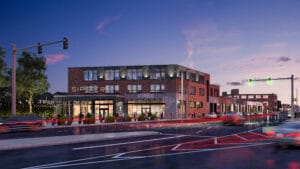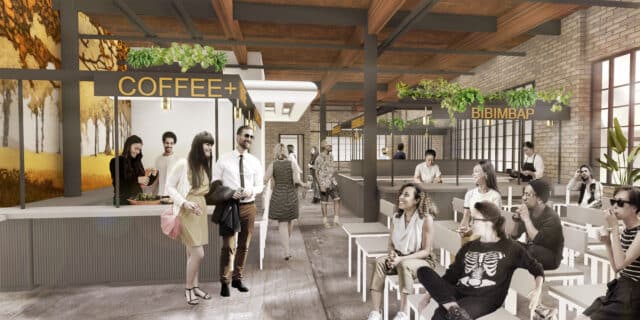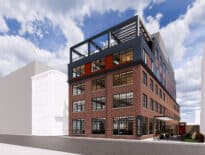
Tatte Cafe has begun production of its baked goods at a new commissary on Old Colony Avenue in South Boston as part of National Development’s strategy of bringing experiential retail to its Dorchester Avenue projects. A cafe will open in spring 2021. Image courtesy of National Development
Most commercial landlords balked when Ciaran Nagle and Tara Novak pitched their vision for a combination commissary kitchen and micro food hall.
“We traveled the length and breadth of Boston and beyond, and got close in a couple of locations,” said Nagle, co-owner of the Foundation Kitchen commercial kitchen in Somerville. “But at the most senior level, we found developers got very frightened by the concept.”
The exception was Young Park, CEO of Boston-based Berkeley Investments, who asked all of the hard questions about the business plan but decided it was the best fit for The Graphic, an adaptive reuse project that’s brought 171 loft-style apartments to Charlestown.
Scheduled to open in early 2021, Foundation Kitchen’s second location will occupy over 6,000 square feet of the ground floor and basement in the Sullivan Square complex. A 55-seat micro food hall will feature four food stalls from five vendors, including a breakfast and lunch cafe that transitions to beer-and-wine bar after 5 p.m. A grab-and-go section will offer contactless takeout items utilizing a mobile app, and space will be dedicated for cooking classes and community events. The lower level will host a shared kitchen and smaller dedicated cooking studios, rented to individual vendors.
“There’s so many moving parts, people are unsure about how it’s going to work,” Novak said.
While complex, the multi-faceted model offers a potential strategy to reflect two trends in 2020 commercial real estate: a steady loss of industrial space in Boston’s urban core, and COVID-19-driven disruption to traditional retail and restaurant models.
Industrial and Retail Coexist in Southie
As it redevelops a cluster of industrial parcels off Dorchester Avenue in South Boston, National Development took an unusual approach to filling 75,000 square feet of ground-floor space at 60-70 Old Colony Ave.
This month, Tatte Bakery opened a commissary churning out baked goods to serve its 11 cafes in Boston, located in 30,000 square feet it’s occupying as anchor tenant.
Commercial kitchen space belongs to a growing list of industrial uses that are steadily being pushed out of the urban core by rising rents and redevelopments into other uses. The space shortage causes operational challenges for boutique food vendors and caterers who need a central production facility close to population centers, said Leah Harsfield, senior vice president of asset management and director of leasing for National Development.
And it created an opportunity for Newton-based National Development, which was looking for an “experiential” retail anchor for the Old Colony Avenue property. A retail cafe is scheduled to open early next year, including viewing areas of production space, and Tatte plans to offer cooking classes and other programs.
“When we thought about this pre-pandemic, the experiential element is critical,” Harsfield said. “You have the cafe experience and can take classes and bring the elements all together, and that is not going to change post-pandemic.”

Somerville-based commissary Foundation Kitchen will open its second location this winter along with a cafe and micro food hall at The Graphic in Sullivan Square. Image courtesy of Berkley Investments
Career Transition to Food Industry
Foundation Kitchen’s roots date back to the global financial crisis of 2008 and career transitions for Nagle and Novak, both natives of Ireland who moved to the U.S. Nagle – an Irish tenor who also has experience in event management – and Novak, a violinist who worked in wine bars, bought a shared commissary in Somerville from a friend who was getting out of the business. They started Foundation Kitchen in 2015, and the commissary rents space to artisan-style vendors on an hourly basis.
“It’s a low barrier of entry into the food industry. We want to reverse the statistics about the high failure rates and create a high percentage of success,” Nagle said.
Each member has its own dedicated space and equipment and operates as an independent business licensed through the local health department, in an arrangement that addresses contamination concerns during COVID, Novak said.
Both the Foundation Kitchen and Tatte Bakery deals were completed prior to the pandemic, but developers say they’re more relevant strategies for retail space than ever. The Boston Planning & Development Agency encourages developers to activate ground-floor spaces with retail or civic spaces, although the agency does not have a formal policy.
While some developers are determined to land a destination ground-floor tenant, others view retail space as an afterthought, said Stephen Pleines, principal at Boston-based brokerage Eastern Land Co.

Steve Adams
“A lot of these buildings per requirements from the city need retail at the base, whether or not the location is really viable for it,” he said. “There’s always a mix in what the landlord wants: Is it the [tenant’s] credit? Is it the cool factor? Putting a CVS at the base of your building isn’t going to give it the same panache as the new wine bar.”
After a grueling two-year search of the market, Pleines found a receptive audience in Berkeley Investments, which was looking for a distinctive retail anchor for The Graphic. The project redeveloped a 1920s-era brick-and-beam building at 32 Cambridge St. into 46 apartments and added a new structure at 34 Cambridge St. containing an additional 125 units.
“We heard from a few more traditional restaurant concepts, but once this group came along it became clear this was a very good business plan and really fit the space well,” said Kevin Longo, asset manager for Berkeley Investments.





